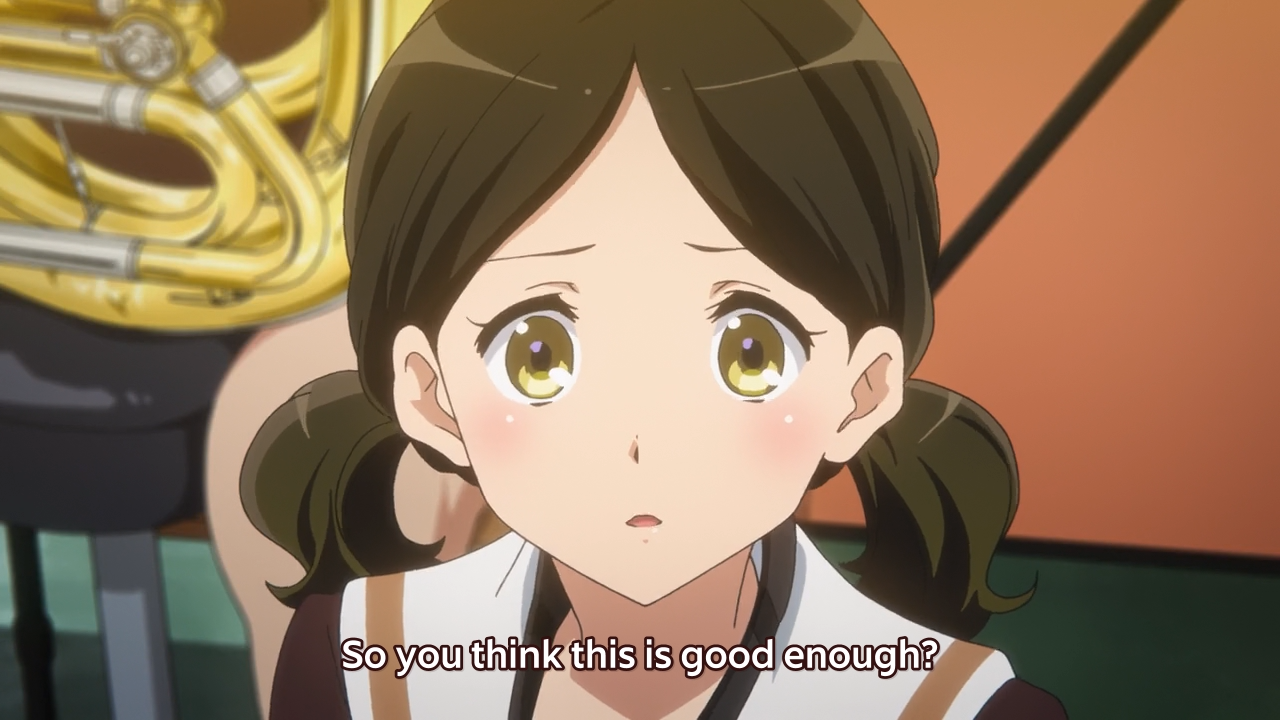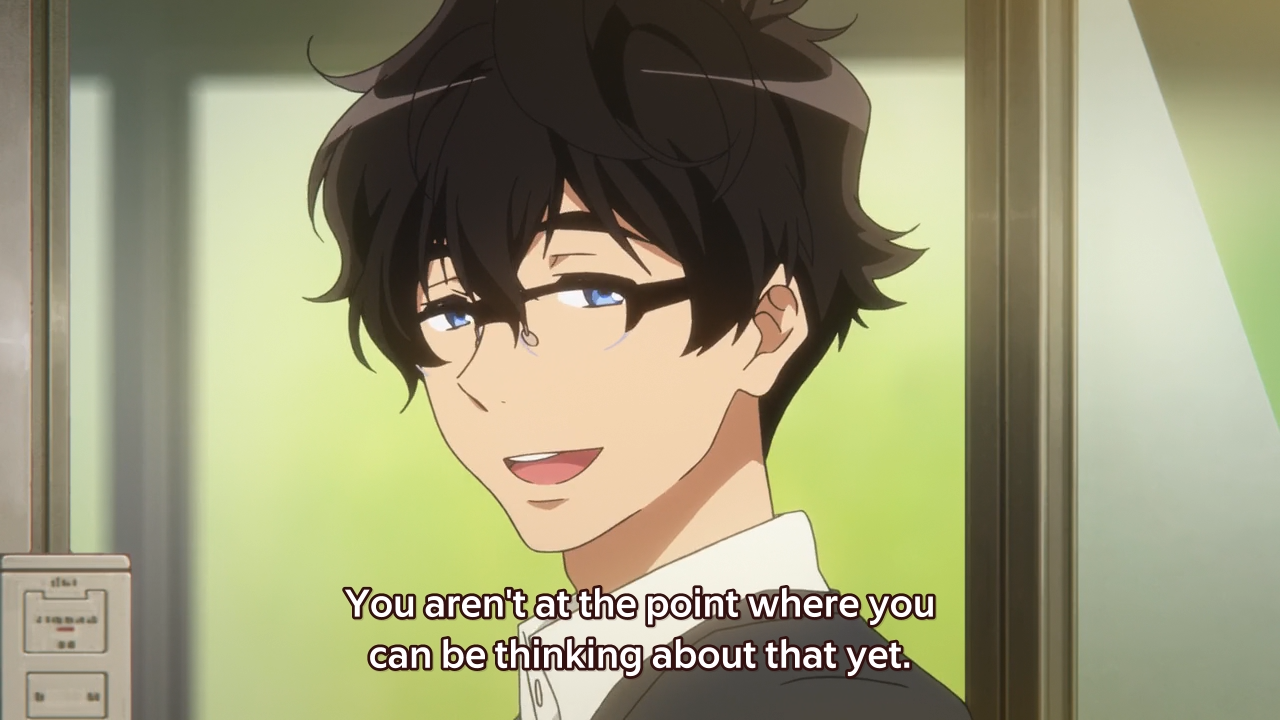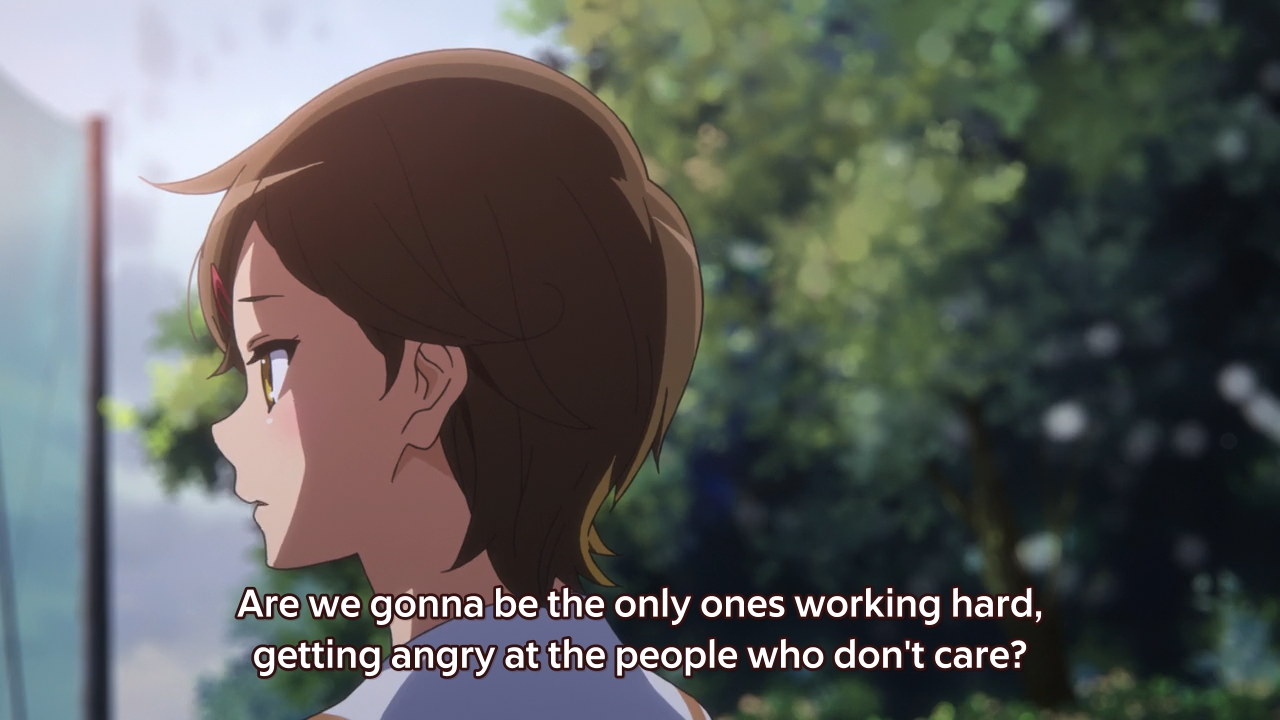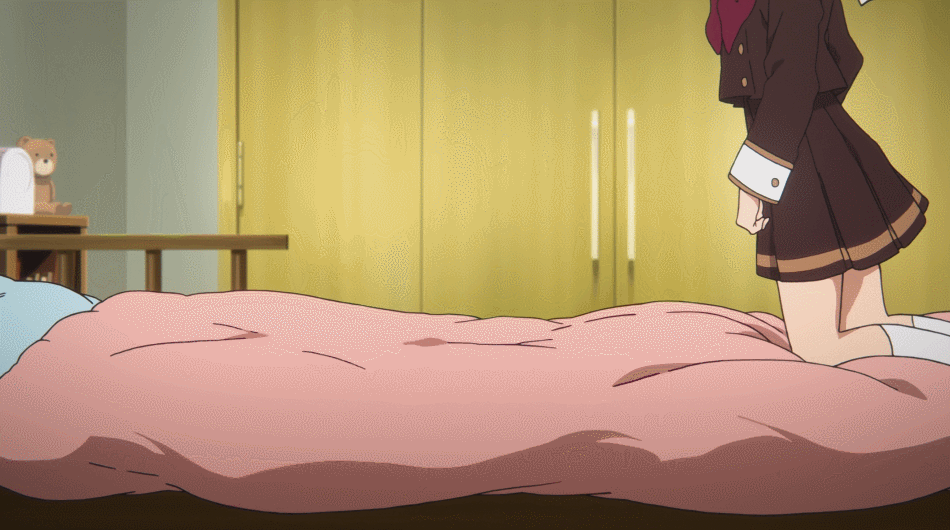Standards of Gold - Sound Euphonium Scene Ep. 1
On the car ride home from hosting the Spring Concert, performing with and leading all four of my ensembles so that they can show off all the hard work they've been doing for the past school year, I wanted to cry.
Not because they did terribly, they tried their best and put on a great show. Not because I think I did terribly, the show when off with minimal hitches. Not even because I was in joy or happy or relieved that it was over - my mind was so occupied because I was frustrated.
Frustrated because I want to do better. I should be doing better. Frustrated that I can't turn back time to do it all over again. Frustrated that my best on that day, at that time wasn't enough. Not to my own standards.
On the empty stretch of backroads highway listening to my Vtuber pop and holding back those tears, I let out a gutteral yell to no one but myself.
It took me back to the first episode, one of the first scenes of one of my favorite anime of all time - Sound Euphonium. This scene, this whole episode even, just sets the tone for not just this arc, but the whole season. It's done in such a way where that it feels so real, so visceral even to those who have even been in any group, not just in the field of music, that does competitions and truly cared about it in some way or another.
It all comes down to your values. Your standards. What you aim to achieve, and what it takes to get there. Then comes the final test of it all - the performance. Will you be in the zone? How much of yourself will you give?
Though no matter what you can possibly give, you are always bound by the results. Your team, your group, your self has to live with the objective outcome.
For some, it might be enough that you tried. Perhaps they do it for the fun of it, or just to have the experience, whatever experience it may be. But others go beyond that. They aim to win. To achieve. To outperform, not just towards opposition but maybe even themselves.
So when they fall short of their goals, it can be crushing. All those blood, sweat, and tears seemingly all down the drain. Perhaps it was your final chance at that success too. In that moment after the results are known, the world feels like shattering and you fall into a pit of cold darkness, not knowing or possibly not wanting to come back from.


As the results of their music competition are announced, Kumiko is satisfied that their group received a high rating - gold. It is, in fact, better than a silver or bronze, so what's not to like? She turns to classmate Reina to share in this moment, but she notices her tears and hears her words: "I hate this". The gold they received is called a "dud gold", a high mark for their performance but not high enough to get to the next level of competing in the national rankings. To Reina, the goal was to reach nationals, just like the entire class had discussed and set their sights on. To her, being surrounded by her peers who were just happy they got a great result is conflicting with her own emotions.
We then get interrupted by what will be Kumiko's unfortunate habit - saying what's on her mind without thinking, almost like a reactionary reflex. "Did you really think we could make nationals?"
A phrase that already admits defeat even before they took the stage to perform. Reina responds expressing her frustration and storms off. I can imagine how she feels and all these emotions and thoughts just boiling inside of her. A combination of blame, guilt, sadness, and much more.
One of the beauties of humanity is our ability of autonomy, which gives us all our independence and choice based on a wide array of factors. The beauty of music and playing in a large music group like band or orchestra is that it's the one place where we come together in agreement to create the magic that is music. To be playing together in one tempo, one tuning, and everyone to their own part but altogether despite these individualist differences to create art out of just air and vibrations. You don't get this experience anywhere else.
But once the music is over, reality sets back in due time. The natural property of life. The band begins to show all their unique personalities once again. Some are glad it's over, others have mixed emotions of happiness of success or a wish to turn back time. In any case, what is done is done. And results are the results. Those with certain standards may be happy, but those with even higher standards might stand to be crushed.

In the case of Reina, she could not stand being with her peers, cheering despite not making their goal. But she's a young musician with much to learn. To feel this defeated just means that she really cares a whole lot. If not about the band, then about herself and her abilities.
This mentality serves as a great contrast to someone like Kumiko, who is hesitant to join the wind ensemble at her new high school in the first place. She has the idea to leave all that music stuff behind. But somehow, perhaps as a cruel twist of fate, music made its way back to her. Even with that calling she wanted to switch instruments. Yet, her first instrument called back to her.
I love Sound Euphonium a whole lot. It's a very real and accurate depiction of not just being in a band, but what happens when you care a lot about a group activity. You will always have varying degrees of people that care to do better or be better or just want to coast along for the ride. But when people agree or just compromise, magic gets made. Though, when pushed to far or no compromise could be made, that's when trouble starts to happen. That drama spans throughout the first season of the anime, and done so well. Not too over-the-top, but realistic and impactful. You can't force people to care. Kids, especially in high school, just want to have fun. But music is an artistic craft, and not an easy one. To learn it means not only learning all the mechanics of playing, but to learn life. Some days the instrument will win. Some days you will win. At the end if it all, however, the instrument will always win. But what you do between it all makes all the difference, and there's no greater bliss and peace than becoming one with your instrument and music.
I may be biased as a music teacher, but I wish that everyone would be able to experience that feeling once in their life.
Music has done a lot for me in many ways, giving me many opportunities to grow myself. I remember in middle school how much I wanted to disappear from earth. I didn't have any self-worth and thought that no one would care if I was gone. Music and being in band saved me from that. At the end of freshman year, I was given a leadership position by a senior who still to this day I never knew why he did. But I went at it with my whole heart. In community college, I was given a chance to perform an entire blues feature with the jazz band, an opportunity to this day I don't know why he thought I could do it, but I went at it fully. My audition for university led me to have a private lesson with the saxophone teacher right after, and to this day I don't fully understand why I was that special to him that he sat down to talk to me and convinced me that going there was the right choice.
I say all this because it took me a long time to get to where I am, a lot of failures and successes, a lot of depression and rising to an occasion. I wouldn't be here if it wasn't for having those high standards for myself. The drive of wanting to improve, wanting what's best not just for myself but the people around me. Sometimes when I perform I do feel like Reina, but other times I do share the same mentality as Kumiko. However, they are two sides of the same coin. Neither of them are right or wrong, but they can and should exist together. Despite a gold being a dud, it should be celebrated, but also serve as a learning opportunity and stepping stone for the next great thing to come. After all, music is life. And as long as I'm living, it's all about being and getting better every day, no matter how small or big.
Man, I really want to learn euphonium.
